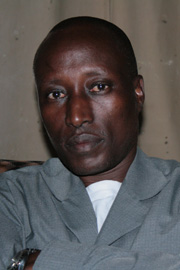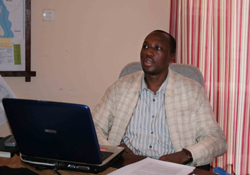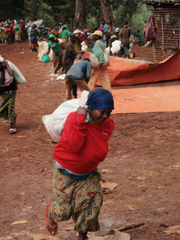
Photo: Jane Some/IRIN  |
| Zachée Muhamiriza, president of the Banyamulenge community in Bukavu, South Kivu Province |
BUKAVU, 3 August 2007 (IRIN) - As the attacks on UN staff on 1 August in Moba town demonstrated, tensions are running high in eastern Democratic Republic of Congo (DRC). While the protests were against rumours of UN support for the return of members of the Banyamulenge ethnic group, the persistent violence in the region draws in several armed groups, local and foreign. According to latest UN figures, there are over 1.1 million displaced in eastern DRC, mainly as a result of conflict.
Ask a displaced person in South Kivu who they think is behind the violence that caused them to flee their homes, and the answer will vary between one of four known groups and those who are unidentified.
Zachée Muhamiriza, leader of the Banyamulenge - Congolese of ethnic Tutsi origin - community in Bukavu, told IRIN he believed most of Congo's problems could be traced to ethnic tension between the Babembe, Bafulero and Banyamulenge, all living in South Kivu. He said the animosity between them dated back to pre-colonial times, with frequent raids against each other for livestock or land.
"I believe that the ethnic tensions between these three groups have been the cause of most problems in the east and they have extended to many parts of the country, with the target mostly being the Banyamulenge," Muhamiriza said.
However, the presence of multiple Congolese and foreign armed groups in both North and South Kivu suggests the causes of the violence go beyond ethnic rivalry.
Some of these foreign armed groups came from Rwanda and entered eastern Congo during and after the 1994 genocide. These were mostly former Rwandan soldiers and members of the Hutu-dominated Interahamwe militia who were behind the genocide.
Congolese groups
Then there are local Congolese factions or armed groups, such as the Rasta and Mayi-Mayi, whose composition is unclear. Residents say the Rasta are a combination of Kinyarwanda-speaking bandits and Congolese, possibly numbering less than 100, with no political agenda, their only objective being to rob and plunder the civilian population.
Constante Chahoundorowa, the leader of a children's civil society group, REPAD, says four main groups are responsible for the continued insecurity in South Kivu: the Forces démocratiques de liberation du Rwanda (FDLR) and the Rasta; insurgents or "dissidents"; armed Banyamulenge fighters who refused to join the national army; and elements of the Mayi-Mayi, a former Congolese militia group that has largely been absorbed into government forces.
The Forces Armées de la Republic Democratic du Congo (FARDC) is the national army. It also plays a major role in the continued conflict.
The FDLR/Rasta
Modibo Traore, head of the UN Office for the Coordination of Humanitarian Affairs (OCHA) in Bukavu, said past joint military operations by the army and the UN Mission in the DRC (MONUC) against the FDLR and the FDLR/Rasta had led to "isolated" attacks on civilians by the Rasta, especially in 2005 and 2006.

Photo: Jane Some/IRIN  |
| Modibo Traore, head of office in the UN Office for Coordination of Humanitarian Affairs in Bukavu, South Kivu |
"The Rasta is believed to be a small group of about 50 to 60 people; they have no political objective, their aim is pure banditry," Traore said. "In the past, the Rasta would kidnap people and ask for ransoms from their relatives; they used to ask for up to US$400 per person, a steep figure for most of the villagers; they would give deadlines, and, if unmet, they would start killing people. They went on and even raised ransom figures to up to $2,000, which not many people can afford."
He added that the FDLR denied any involvement with the Rasta but said the Rasta reportedly operate in areas controlled by an FDLR commander known as Mutima. Most operate in Kahuzi Biega National Park, often raiding civilians in villages close to the forest for supplies.
General Sylvain Tshikwej, FARDC commander of the 10th Military Region, said the Rasta included deserters from the FDLR. "These elements use Congolese as guides during the raids," he said. "The army has been carrying out operations against the Rasta in Minembwe area [50km south of Bukavu] and they will continue until the group is eliminated."
Background to the FDLR
The FDLR emerged from the former Rwandan army (Forces Armées du Rwanda) and members of the Interahamwe who fled Rwanda after the genocide. "These people fled with their arms although they came to Congo as refugees," Chahoundorowa said.
In 1996, the new regime in Rwanda and Uganda supported a rebellion (against then President Mobutu Sese Seko), which began in the Kivus and was led by Laurent Kabila, who took power in 1997.
But in the subsequent war in 1999-2003, Chahoundorowa said, they entered the country again, this time against Kabila.
"During this war, the FDLR supported Kabila in fighting Rwanda," Chahoundorowa said. When the war ended, more Rwandan Hutu soldiers deserted and joined the FDLR, he said. Efforts to disarm and return the FDLR home have not succeeded, despite the surrender and return to Rwanda of Maj-Gen Paul Rwarakabije, he continued.
Clashes and displacement
OCHA's Traore said: "There was a lot of hope in the [2006] elections but the polls did not address the main political issue in the east, this is the FDLR," he said. "The government needs to address the FDLR problem because it is the main cause of humanitarian problems in the east."

Photo: Jane Some/IRIN  |
| A woman displaced by the fighting carries a sack of maizemeal she received during a food aid distribution in Walungu Territory, South Kivu |
"The FDLR are armed; they remain in the bush and survive by exploiting the country's mineral wealth as well as raiding Congolese villagers where they loot and rob people and also commit crimes such as rape and murder," Chahoundorowa said.
"I say the Rasta is one with the FDLR because they operate untouched in areas that are controlled by the FDLR. How they operate is this: because FDLR cannot raid the people in the areas they control and are known to the people, they send a small group of their men to distant villages to loot and rob; they distance themselves from such groups, saying they are the Rasta, yet in reality they are the same. How come the loot the Rasta take often ends up in the hands of the FDLR or being shared in areas that are controlled by the FDLR?"
Traore added that ethnic tension between the Banyamulenge and a group of former Mayi-Mayi militiamen, who have refused to join the army's 'brassage' (reintegration) programme, is another cause of displacement in Minembwe (South Kivu) where the Banyamulenge are the dominant community.
Army action
General Tshikwej said the FDLR in South Kivu comprised at least one division of three brigades, each with at least 3,000 troops, putting the estimated number at about 9,000 men.
He said the army was concerned that the militia continued to rape, abduct and rob civilians, especially in Walungu territory, west of Bukavu.
"I can assure you that military measures have been taken to fight the Rasta; unfortunately, these operations have resulted in the displacement of a lot of people in some of these areas," he said.
He cited an incident in early July when the Rasta sent a woman to get food from a village within the Kaniola area.
"The woman didn't want to go back to the Rasta, and this caused an attack on villagers near where the woman had sought refuge," Tshikwej said. "The other problem we are dealing with is that of dissident soldiers, although we have convinced many of them to go for brassage, some have refused and continue to stage sporadic attacks; we are dealing with these people also."
He said although the army was covering many parts of South Kivu, the dissidents staged an attack in early July, killing one person and burning nine houses in a village in Minembwe, 150km south of Bukavu.
"Again last week [mid-July], the dissidents attacked two FARDC positions, killing four soldiers and injuring six others; it was after these attacks that I ordered an attack on all the dissidents' positions. The war against these people will continue until they accept brassage. There shall be no negotiations."
The army's attitude means that South Kivu can expect more displacement as the army seeks to contain the various armed groups.
js/bp/mw













